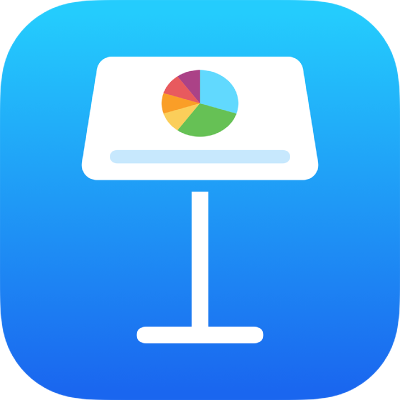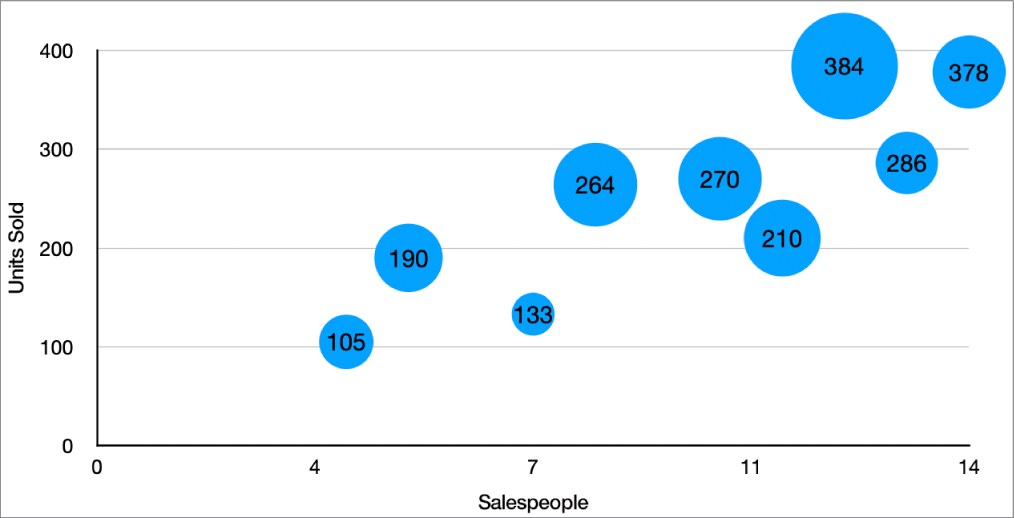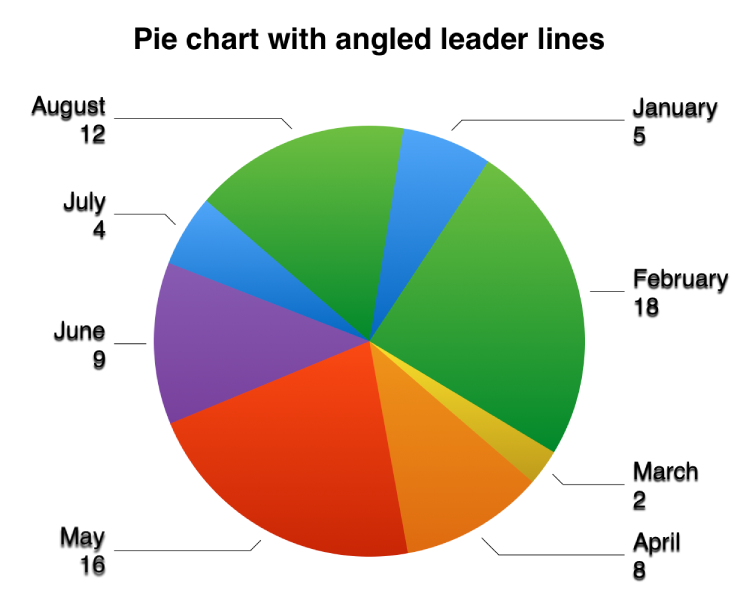
Change the look of chart text and labels in Keynote on iPhone
You can change the look of chart text by applying a different style to it, changing its font, adding a border and more.
Change the font, style and size of chart text
You can change the look of all the chart text at once.
Tap the chart, then tap
 .
.Tap Style, then tap Labels.
Do any of the following:
Change the font: Tap Chart Font, then tap a font name.
If you can’t see Chart Font, swipe up from the bottom of the controls.
Change the font style: Tap Chart Font, tap
 next to the font name, then tap a style (for example, Regular, Bold and so on).
next to the font name, then tap a style (for example, Regular, Bold and so on).Make the font smaller or larger: Tap
 .
.All text in the chart increases or decreases proportionally (by the same percentage).
Tap
 to close the controls.
to close the controls.
Edit the chart title
Charts have a placeholder title (Title) that’s hidden by default. You can show and rename the chart title.
Tap the chart, tap
 , then tap Chart.
, then tap Chart.Turn on Title.
To change the alignment of the title — so it’s on the left of the chart, for example — tap Style, then choose an alignment option.
To move the title to the centre of a doughnut chart, tap Position, then tap Centre.
To edit the title, double-tap it (a box appears around it), then select the text, type a new title and tap Done.
Add and modify chart value labels
Charts have labels that show the values of specific data points. You can specify a format for them (for example, number, currency or percentage), change where they appear, how they look and more.

Tap the chart, tap
 , tap Style, then tap Labels.
, tap Style, then tap Labels. To add value labels, do one of the following:
For pie or doughnut charts: Turn on Values.
You can also display data labels in pie charts and doughnut charts by turning on Data Point Names.
For bubble charts: Tap Values below Bubble Labels, then choose which values to display.
For scatter charts: Tap Values below Data Point Labels, then choose which values to display.
For other types of chart: Tap Value Labels, then choose an option.
To fine-tune the value labels, tap Number Format, turn off Same as Source, then do any of the following (these controls are available only for some chart types):
Choose a format for the label: Tap a format (for example, Number, Currency or Percentage).
Set the number of decimal places: Tap
 , then tap the + or –.
, then tap the + or –.Show the thousands separator: Tap
 , then turn on the Thousands Separator.
, then turn on the Thousands Separator.Choose how to display negative numbers: Tap
 , then choose “−100” or “(100)”.
, then choose “−100” or “(100)”.Add a prefix or suffix: Enter text. It’s added to the beginning or end of the label.
Note: If you leave Same as Source turned on, the value labels are displayed in the same format as the source data in the original table.
To change the font, colour and style of all labels, use the controls at the top of the Labels tab.
To change the look for just the data series labels, tap Style below Series Values (or below Data Point Labels for scatter charts, below Bubble Labels for bubble charts, or below Values for Pie and Doughnut charts), then do any of the following:
Change the font: Tap Font and choose a font, or tap to change the character style (such as bold or italic).
Change the text size: Tap the number and type a new size, or tap the – or + buttons next to Size.
Change the text colour: Tap the colour well, then tap Preset or Colour.
Add a shadow to the text: Turn on Shadow.
Note: The font for labels changes when you change the font for the entire chart in the Chart tab of the Format menu.
If you created a pie or doughnut chart, you can position the value and data labels, and add leader lines to connect them to their wedges or segments. In the Labels tab, tap Position, then do any of the following:
Change the position of the labels: Drag the Distance from Centre slider to set where the labels appear. Moving the labels further from the centre of the chart can help separate overlapping labels.
Add leader lines: Turn on Leader Lines, then tap Straight or Angled. (With angled leader lines, the callouts align into columns, as shown below.) You can change the line type, colour and width of the leader lines and add endpoints to them.

Modify axis labels
You can specify which labels appear on an axis, edit their names and change their angle of orientation.
Tap the chart, then tap
 .
.Tap Style, then tap Labels.
Do any of the following:
Modify markings on the Category (X) axis: Tap Value Labels under Value (X) Axis.
Modify markings on the Value (Y) axis: Tap Value Labels under Value (Y) Axis.
Use the controls to make any adjustments.
If you turn on Axis Name, Keynote adds a placeholder axis name to the chart. To change it, select the axis name, then type your own.
Note: Axis options may be different for scatter and bubble charts.
To add a caption or label to a chart, see Add a caption or title to objects in Keynote on iPhone.